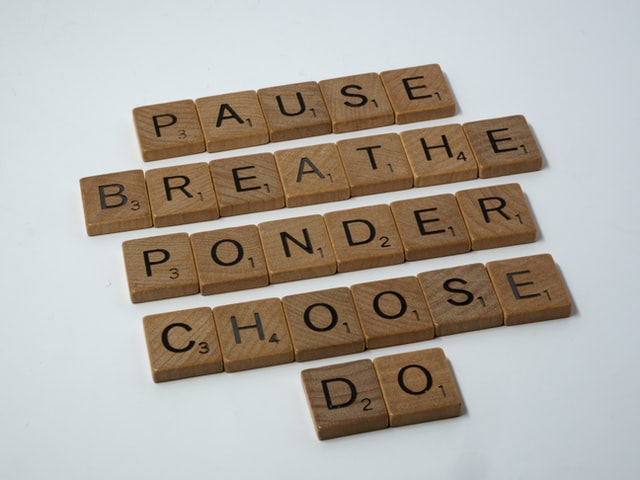As much as we try to organize our lives, chaos always manages to make its way in. With work from home, hybrid working, online learning and in person school, while trying to navigate the new normal can be overwhelming. Here are tips on how to find calm in the chaos in all aspects of your life.
We can wear our “positive vibes” t-shirts, light candles, take bubble baths and do daily, positive affirmations and though all these practices can help cultivate a positive perspective, there will still be moments where life feels full of worry, stress and chaotic. Why? It’s as simple (but as complicated as) as life is challenging – it throws us curve balls and sometimes the hit will create a flurry of chaos as it knocks us down.
Alongside the unexpected curve balls, we’re also doing our best to play with the balls that come our way daily (also known as tasks and responsibilities). Family, work, school, friendships, cleaning, exercise, self-care – our plates are all different but for many of us, they are regularly full. When our plates are overloaded, we can feel overwhelmed and the sensation of feeling pulled in several directions at once, creating an experience of chaos can arise. The bad news is, feeling chaotic happens to all of us from time-to-time, the good news is there’s conscious actions we can take to support ourselves through it.
Check out these tips on how to keep calm during chaos:
Name your emotions to tame your emotions: Before we can calm any feelings of chaos, we need to face them. Sometimes when we feel overwhelmed, we tell ourselves to just keep pushing through and ignore what’s arising. Ignoring those feelings can cause harm by burying our worry, stress, anxiety into our body and adding a layer of confusion and/or distraction to our decision-making process.
Use mindful self-compassion to remind yourself it’s natural to feel overwhelmed at times – we’ve all been there. Validate your emotions to help ensure you’re not adding any layers of shame or guilt to them because that will only add to your discomfort and feelings of chaos.
Practice accepting your emotions by acknowledging them:
“I feel overwhelmed and that’s okay. I have a lot of responsibilities and how I feel is valid. No one feels positive all the time, and no one has it all together all the time.
It’s okay for me to have a hard moment, life’s hard right now and I have confidence in myself that I will work through this.”

Stop and slow down: Have you ever been in a hurry to get out of the door but can’t find your keys? The urgency makes you panic and instead of using rational thinking on where you last used them, you frantically rush around increasing the amount of time it takes to find them not to mention your stress level.
When we feel like we have to much chaos to stop and slow down is exactly when we need to do so the most. It seems counter-productive but it’s not: taking a pause can prevent us from acting in a reactive state which can cause more miscommunication, misunderstanding and/or increase the margin of error in what we’re trying to accomplish.
When you feel the need to frantically speed up arising in your mind, body, and spirit, stop, take a few breathes to ground yourself and ask yourself two questions:
“What do I really need to accomplish in this moment?”
“What’s the first step can I take to help myself accomplish that?”

Differentiate between the wants and needs on your “to-do” list:
Keeping a to-do-list is a helpful way to calm our chaos by serving as a visual representation of everything we have going on. Organizing our thoughts on paper (or in an app), clears up mental capacity — instead of our energy going to remembering all our responsibilities, we can focus on the steps we’ll take to action accomplishing them. To-do lists are helpful but it’s important to approach them as fluid they rarely end because the more we get done, the more we keep adding.
When making your daily list (daily is suggested and weekly is also helpful), write everything out and then go back for further review and ask yourself:
“What on my to-do list is a need versus a want?”
For example, you need to eat food, versus you want to cook a fresh, gourmet meal every day – some days that cooking may not be feasible (meal prepping a few days at a time can help).
Another important question to ask yourself is:
“Why do I feel pressure to get everything done all of the time?”
Remind yourself it’s about progress not perfection. At the end of the day, instead of focusing with harmful thoughts on everything that you didn’t get done, celebrate everything you did get done. Set healthy boundaries with the people in your life – it’s okay to say no, it’s okay to tell people you don’t have the capacity to meet their request. Boundaries are a form of self-love and self-care and they go long way in helping us feel calm.
Rachna Sethi
Author
Rachna (@thesassyspiritual) is a graduate of the Applied Mindfulness Meditation program from the University of Toronto, a certified Educator with two bachelor degrees and a diploma in Art Therapy. She's dedicated to living with a compassionate approach. Committed to helping people integrate Mindfuln...


















































































































